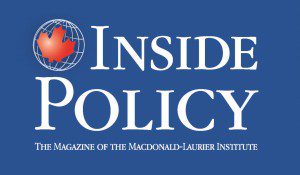In the new edition of Inside Policy, the magazine of the Macdonald-Laurier Institute, Ailish Campbell and Brian Kingston argue that opening up internal trade between provinces is needed to propel export growth.
The authors, both of whom are with the Canadian Council of Chief Executives, show that barriers to internal trade are holding Canadian companies back from becoming giants that can take the world by storm.
By Ailish Campbell and Brian Kingston, Nov. 17, 2014
Canada’s long-term prosperity depends on our country’s ability to sell goods and services around the globe. An extensive network of free-trade agreements, including the recently announced Canada-European Union Comprehensive Economic and Trade Agreement (CETA), ensures that our companies benefit from preferential access to the world’s largest and richest markets. To take advantage of these trade agreements, however, we need companies with the scale and resources to pursue new markets.
The larger the company, the greater the likelihood that it sells outside Canada. In 2010, only one per cent of the small businesses in Canada were exporters. Among large firms, the proportion was 43 per cent. Companies with more than 500 employees represent only 0.2 per cent of Canadian businesses, yet they generate nearly two-thirds of our country’s total exports.
How can we help more small and medium-sized enterprises (SMEs) grow into large, successful exporters? We could start by establishing a common Canadian marketplace that is free of internal barriers. Industry Canada research shows that SMEs that trade across Canada – rather than focussing their activities on one province or region – tend to employ more workers, are more innovative and are more likely to export1. Conversely, SMEs that don’t do business across provincial boundaries are less likely to grow.
The link is clear. Growth-oriented SMEs trade both within Canada and abroad. We need to create an environment that encourages more fast-growing SMEs to become global champions on the scale of a Bombardier, SNC-Lavalin or Manulife, to name three examples. One of the keys to achieving this is to provide for the free movement of goods, service, people and capital within our own borders.
Canada’s patchwork of domestic rules and regulations makes it challenging for firms to expand. How is a company to compete in the United States or Europe if it does not operate in a single market at home?
The outdated Agreement on Internal Trade (AIT) needs to be modernized to reflect the following five principles:
- The AIT must be as ambitious and comprehensive as any trade agreement Canada has with a foreign country. One way to achieve this is to adopt the “negative list” approach embedded in CETA: all sectors of the economy would be covered by the agreement unless explicitly excluded.
- The concept of mutual recognition should apply to the full scope of the agreement. Under this concept any product or service produced in one province or territory should be admitted into the market of any other province or territory unless there is a justified reason for the exemption.
- We should aim for the highest possible level of regulatory cooperation among provinces and territories. The “comply or explain” approach to regulation would accelerate work on achieving common standards. In addition, the AIT should include a formal mechanism to facilitate regulatory cooperation that allows businesses to participate.
- The agreement must include an effective and efficient dispute-resolution mechanism. This could be achieved by adopting a domestic equivalent of investor-state dispute settlement and subjecting compliance panel and appellate panel reports and decisions to judicial review.
- An effective governance structure should be established to manage the economic union and push forward with necessary reforms. Under the current consensus-based decision-making model, any one province or territory can veto or delay important amendments – a recipe for inaction.
While progress has been made in recent years in some areas, more ambition is needed. For example, efforts to strengthen labour mobility provisions have not eliminated significant differences in occupational standards and certification requirements. As a result, it is still harder than it should be for skilled workers to relocate to regions where they are needed. Achieving full labour mobility requires alignment of professional standards, something the provinces and territories have been slow to embrace.
Creating efficient capital markets is the final piece of the puzzle. Canada’s antiquated approach to securities regulation is uncoordinated and subject to inconsistent interpretation and enforcement. A pan-Canadian securities regulator would boost competitiveness by eliminating duplication, reducing unnecessary red tape and compliance costs, and enhancing oversight. This would also encourage the growth of innovative SMEs by making it easier for them to access the capital needed to expand.
To succeed internationally, Canadian companies need a strong base of operations at home. Eliminating interprovincial trade restrictions will strengthen the economic union, improve competitiveness and fuel the growth of Canadian companies with the scale and resources to succeed abroad. The time is now for leadership from all levels of government.
The co-authors are with the Canadian Council of Chief Executives. Ailish Campbell is Vice President, Policy, International and Fiscal Issues and Brian Kingston is a Senior Associate.






